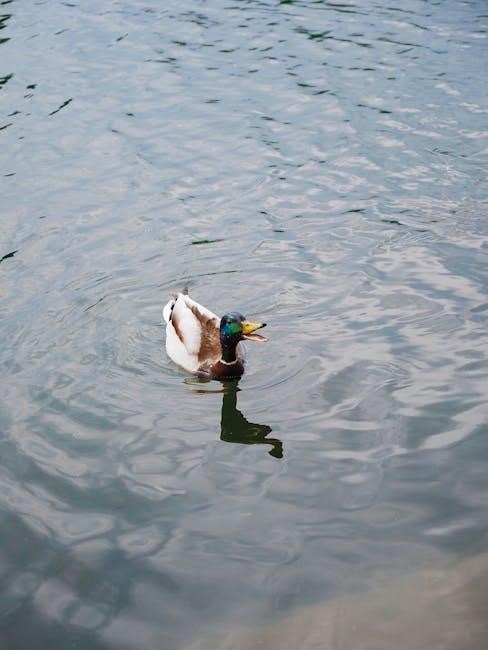About the Story
E.B. White’s essay “Once More to the Lake” reflects on his childhood memories of visiting a lake in Maine.
First published in Harper’s Magazine in 1941‚ it captures the essence of nostalgia and the passage of time.
The story explores themes of family‚ nature‚ and self-reflection‚ resonating deeply with readers.
Background and Publication
E.B. White’s essay “Once More to the Lake” was first published in Harper’s Magazine in 1941‚ becoming one of his most celebrated works.
The story is deeply personal‚ as it reflects White’s own experiences of revisiting Belgrade Lakes in Maine‚ a place he had frequented as a child.
White’s return to the lake as an adult sparked a meditation on time‚ change‚ and the enduring connection to nature and family.
The essay has since been widely anthologized‚ appearing in numerous collections of American literature‚ and remains a staple in academic and literary discussions.
Its timeless themes and lyrical prose have cemented its place as a cornerstone of 20th-century American essays.
Setting: The Lake in Maine
The story “Once More to the Lake” is set in Belgrade Lakes‚ Maine‚ a serene and picturesque location that holds deep sentimental value for the narrator.
The lake‚ surrounded by dense forests and untouched wilderness‚ serves as a tranquil retreat from the hustle of urban life.
White vividly describes the natural beauty of the area‚ from the crystal-clear water to the towering trees and the abundant wildlife‚ creating an idyllic atmosphere.
The setting plays a crucial role in evoking nostalgia‚ as the lake remains largely unchanged from the narrator’s childhood‚ yet the passage of time is evident in subtle details.
The cabin where the narrator stays with his father symbolizes simplicity and closeness to nature‚ contrasting with the modern world’s complexities;
The lake’s enduring presence becomes a symbol of continuity‚ bridging the past and present‚ and emphasizing the timeless connection to the natural world.
The Author’s Personal Experience
E.B. White’s essay “Once More to the Lake” is deeply rooted in his personal memories of visiting a lake in Maine during his childhood.
The narrator recalls spending a summer at the lake with his family in 1904‚ a experience that left an indelible mark on his life.
Years later‚ White revisits the same lake with his son‚ sparking a flood of emotions as he confronts the passage of time.
The essay reflects White’s intimate connection to the natural world and his longing for the simplicity of his youth.
His personal journey is one of self-reflection‚ as he grapples with the realization that he has become the father figure he once admired as a child.
White’s experiences at the lake are not just a recollection of events but a profound exploration of identity‚ family‚ and the enduring influence of childhood memories.
Plot Summary
E.B. White’s essay “Once More to the Lake” recounts the narrator’s nostalgic return to a lake in Maine‚ where he had spent summers as a child.

The story begins with the narrator revisiting the lake decades later‚ this time with his own son.
He reflects on the unchanged beauty of the lake and its surroundings‚ yet struggles with the realization that time has transformed him into the father figure he once observed as a child.
The narrator recalls memories of his father renting a camp on the lake in 1904‚ highlighting moments of joy and the simplicity of childhood.
As the narrator watches his son experience the lake‚ he grapples with the passage of time and the inevitability of aging.
The essay concludes with a poignant acknowledgment of the cyclical nature of life‚ as the narrator accepts his role in the continuum of family and memory.
The plot is a subtle yet powerful exploration of nostalgia‚ identity‚ and the enduring connection between generations.
Significance in American Literature
E.B. White’s “Once More to the Lake” holds a revered place in American literature for its timeless exploration of nostalgia‚ family‚ and the human connection to nature.
First published in 1941‚ the essay is celebrated for its lyrical prose and profound meditation on the passage of time‚ resonating with readers across generations.
It is often anthologized and studied in academic settings‚ exemplifying White’s mastery of the personal essay genre.
The work is particularly noted for its universal themes‚ transcending personal experience to evoke shared emotions and reflections on life’s cycles.
Its influence can be seen in later writers who have adopted similar introspective styles to explore nature‚ memory‚ and identity.

The essay’s enduring popularity underscores its ability to bridge the past and present‚ making it a cornerstone of American literary heritage.

Its concise yet deeply symbolic narrative continues to inspire writers and captivate readers‚ solidifying its significance in the literary canon.

Themes and Analysis
E.B. White’s “Once More to the Lake” explores themes of nostalgia‚ the passage of time‚ and the human connection to nature‚ delving into family dynamics‚ self-reflection‚ and symbolic elements that evoke universal emotions and introspection;
Nostalgia and the Passage of Time
E.B. White’s “Once More to the Lake” is a poignant exploration of nostalgia and the inevitable passage of time. The essay recounts White’s return to a lake in Maine‚ a place he visited as a child‚ now revisited decades later with his own son. This journey sparks a deep sense of nostalgia‚ as White recalls the joy and simplicity of his childhood summers. However‚ the trip also reveals the bittersweet nature of time’s passage‚ as he grapples with the realization that he has become the father figure he once admired. The lake‚ unchanged over the years‚ serves as a symbol of timelessness‚ contrasting with the irreversible changes in White’s life. Through this reflective narrative‚ White conveys the universal human experience of longing for the past while acknowledging the inevitability of aging and change. The essay masterfully captures the emotional tension between cherished memories and the realities of growing older.

Connection to Nature
E.B. White’s “Once More to the Lake” profoundly explores the human connection to nature‚ using the lake in Maine as a central symbol. The essay vividly describes the serene and timeless beauty of the lake‚ evoking a sense of tranquility and wonder. White’s detailed depiction of the natural surroundings—such as the water’s clarity‚ the sounds of the wilderness‚ and the rhythm of the seasons—highlights the enduring appeal of nature. The lake serves as a source of comfort and inspiration‚ offering a escape from the complexities of modern life. White’s return to the lake as an adult underscores the idea that nature remains a constant in an ever-changing world. Through his reflections‚ White expresses a deep appreciation for the simplicity and beauty of the natural world‚ emphasizing its ability to evoke emotions and memories that transcend time. The essay ultimately celebrates the profound bond between humanity and the environment‚ illustrating how nature can foster introspection‚ peace‚ and a sense of belonging.
Family Dynamics and Memories
E.B. White’s “Once More to the Lake” delves deeply into the interplay of family dynamics and the power of memories. The essay recounts White’s childhood vacations at a lake in Maine‚ where his father rented a camp for the family. These annual trips were pivotal in shaping White’s relationship with his father‚ fostering a sense of closeness and shared experience. The memories of swimming‚ fishing‚ and exploring the lake with his siblings and parents are portrayed with vivid detail‚ highlighting the simplicity and joy of family life. When White returns to the lake as an adult with his own son‚ the experience evokes a mix of nostalgia and melancholy. He reflects on how the roles have reversed—once the child‚ now the father—while the lake remains a constant. The essay captures the universality of family memories‚ emphasizing how they bind generations and transcend time. Through these recollections‚ White illustrates the enduring importance of family and the bittersweet passage of life.
Inner Conflict and Self-Reflection
E.B. White’s “Once More to the Lake” is a profound exploration of inner conflict and self-reflection. The narrative unfolds as White revisits the lake in Maine‚ a place steeped in his childhood memories. Upon returning‚ he grapples with the duality of time—cherishing the past while confronting the inevitability of change. The lake‚ once a symbol of youthful freedom‚ now serves as a mirror reflecting the passage of years. White’s internal struggle is palpable as he oscillates between nostalgia for his carefree childhood and the realities of adulthood. His observations of his own son at the lake further intensify this introspection‚ prompting him to confront mortality and the cyclical nature of life. The essay becomes a meditation on identity‚ as White reconciles his past self with his present reality. Through this journey‚ he illustrates the universal human experience of grappling with time’s relentless march and the bittersweet beauty of self-discovery.
Social and Historical Context
E.B. White’s “Once More to the Lake” is set against the backdrop of early 20th-century America‚ reflecting the societal norms and values of the time. The essay‚ published in 1941‚ captures a moment of transition‚ both for White and the nation. The lake in Maine‚ a symbol of simplicity and tradition‚ contrasts with the rapid modernization and urbanization of the era. White’s return to the lake during a period marked by global upheaval‚ such as World War II‚ underscores a collective longing for stability and nostalgia. The story also highlights the middle-class family dynamic‚ with fathers taking charge of summer vacations and mothers managing domestic life. The essay subtly critiques the encroachment of technology and commercialization on natural spaces‚ echoing broader concerns about environmental preservation. By revisiting his childhood‚ White not only reflects on personal growth but also comments on the changing social fabric of America‚ offering a poignant critique of progress and the loss of innocence.

Symbolism in the Story
The lake in E.B. White’s “Once More to the Lake” serves as a powerful symbol of time‚ memory‚ and the human connection to nature. The lake itself represents a timeless‚ unchanging essence‚ contrasting with the inevitable passage of time and the narrator’s evolving perspective. The water symbolizes clarity and reflection‚ both literal and metaphorical‚ as White contemplates his past and present selves. The boats on the lake‚ particularly the rowboat and the outboard motorboat‚ symbolize the transition from simplicity to modernity‚ reflecting broader societal changes. The fish and the natural surroundings embody the enduring beauty and resilience of nature‚ while also highlighting the fragility of these elements in the face of human activity. The cabin and the camp represent a sanctuary of childhood innocence and family bonds‚ which the narrator struggles to reconcile with his adult reality. Through these symbols‚ White crafts a deeply introspective narrative that explores the interplay between permanence and change‚ both within individuals and the world around them.







